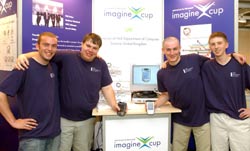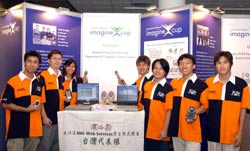BARCELONA, Spain, June 30, 2003 — Imagine going to the supermarket and not having to bring your shopping list — because it appears on a video screen on your shopping cart. Imagine your “smart cart” letting you know when you come to items you want to purchase, and directing you through the store to items on your shopping list. Imagine the smart cart letting you know when your friends are also shopping in the store. Finally, imagine skipping the line at the checkout — because your smart cart has already totaled your purchases and lets you pay by touching a button on the screen.
If you can imagine all that, you’re not alone. Students at Nanyang Technological University in Singapore imagined it 18 months ago — and this week their idea puts them in contention for the first worldwide Imagine Cup Student Programming Contest, and a US$25,000 first prize.
The competition, sponsored by Microsoft, is designed to help today’s student developers realize their potential — as well as the potential of the software solutions they dream up. The contest encourages creativity and imagination among students by asking them to develop innovative software applications showcasing the Microsoft Windows platform and Microsoft .NET Framework for creating Web services — software that connects people, platforms, software and devices, allowing them to share information and services over the Internet.

Team Singapore from the Nanyang Technological University School of Computer Engineering (from left): Kapil Vaidyanathan, Anumeha Bisaria, Harishankar Vijayarajan, Kunal Talwar. Click image for high-res version.

Team UK from University of Hull, Department of Computer Science (from left): Phil Price, Andrew Sterland, Will Johnson, David Waby. Click image for high-res version.

Team Taiwan from the National Tsing Hua University, Department of Computer Science (from left): Hsueh Po-Chien, Fu Szu-Wei, Chen Ching, Huang Bo-Jye, Hsu Mao-Juan, Lo Jui-Lin, Hsieh Ming-Fong. Click image for high-res version.
The software solution for that shopping scenario — called “AutoShop” — was just one of thousands of student entries from 25 countries submitted for the Imagine Cup competition. Regional semifinal competitions were held earlier this year. AutoShop is one of 15 finalists, all of whom are presenting their solutions today (June 30) to a panel of academic and independent industry experts at Microsoft’s international Tech
·
Ed 2003 Europe Conference in Barcelona. Team applications will be judged on creativity and real-world applicability.
Other finalists include:
-
Tu Nguyen, a student at the University of Nebraska, devised a multi-language solution that enables waiters to beam customers’ orders directly into a restaurant kitchen — and into the language that the chef understands.
-
A team from the United Kingdom’s Hull University created a solution to turn a Pocket PC into a sophisticated traveling companion that handles currency and language translation as well as recommendations and directions to hotels, restaurants, and tourist sites, all in real time.
-
Students from National Tsin Hwa University in Taiwan imagined a way to figure out the name of the tune that keeps popping into your head: hum a few bars of it into your Smartphone, and their Imagine Cup entry will do a voice-to-data conversion that searches a music library and returns the music, along with related information, to you.
While only one of these teams, hailing from Asia, Europe, Latin America, and the United States, will walk away with the $25,000 first-place prize, second- and third-place winners will receive $15,000 and $10,000, respectively. But to hear the contestants tell it, the prize money is secondary to their larger commercial or social goals. These students are excited and motivated about the prospects of developing .NET-connected Web solutions.
“I wasn’t a developer, but I turned to Microsoft’s .NET Framework for Web services because my parents needed a better way for American-born waiters in their restaurant to communicate with the Vietnamese chefs in the kitchen,” says the University of Nebraska’s Nguyen, who came to the U.S. with his family 13 years ago from Vietnam. “The local TV station ran a story on my solution, seven other restaurants in Omaha hired me to deploy similar solutions for them, and now the City of Omaha wants to use my solution to serve hundreds of thousands of customers in the new city sports arena. I can envision using this solution virtually everywhere.”
Similarly, the team from Hull University, comprised of first-year students, is looking to develop a business from its first project with Web services, “Mercury– The Traveler’s Assistant.”
“I’m very impressed that first-year students are approaching their first .NET-connected development effort in such a professional way,” says Robert Miles, Academic Team Leader at Hull. “They learned very quickly what it takes to produce a commercial product. They had most of this together in a month, and all of it completed within three months. It’s clear that after the competition, the students will want to pursue a business model and run with it — and they have every reason to be successful.”
Taiwan’s team is equally ambitious but with very different goals.
Po-Chien Hsueh, chief of the Taiwan student team, says he and his fellow students have spent their past few years researching sound recognition and composition — not developing software. But they found it difficult to share information and collaborate with researchers outside their lab and at other universities. Audio-based databases and programs didn’t interoperate very well. The students set out to correct that.
“We used Web services because they made communication between programs easy and convenient, which is great for people like us, who aren’t programmers,” says Hsueh. “Further, we want to share our software with researchers in other fields, who may not be programmers either. Web services make this possible. We believe that the .NET Framework will become the leading software development platform over the next decade.”
The Singapore team is likewise excited about the commercial possibilities of AutoShop, about their own careers in technology, and about developing with the .NET Framework.
“We’re talking about AutoShop with supermarkets here in Singapore and in Australia,” says Harishankar Vijayarajan, a member of the team at Nanyang Technological University. “We’ve just graduated and we’ve all taken jobs with leading software developers and integrators. Microsoft’s ultimate vision is to give people access to their information anywhere. The .NET Framework is what makes that possible. It’s the future.”
The sophistication of the students’ projects surprised Morris Sim, Director of the Academic Developer Group at Microsoft and the organizer of the Imagine Cup competition — although their enthusiasm for .NET-connected solutions came as no surprise.
“The Imagine Cup entries are technically sound, creative and innovative,” says Sim. “These students really see where Web services are going. They get it. And they’re indicative of the excitement we see more broadly in colleges and universities over the possibilities of .NET-based solutions.”
Sim’s view into the worldwide academic community is a broad one. His Academic Developer Group at Microsoft works with hundreds of universities around the world to support students and faculty members in their development of innovative software solutions.
Another program designed to open doors for students is MSDN Academic Alliance. It enables all students and faculty of a computer science, engineering, or information science department to use virtually all Microsoft software-development tools and enterprise products for a single licensing fee of $799. Another is the GotDotNet Student site, a student version of Microsoft’s popular Web site for developers, fosters student peer networks and opening lines of communication with Microsoft experts.
The judging of the Imagine Cup competition is expected to conclude today, with the winners announced on Tuesday during the Tech
·
Ed 2003 Europe keynote address of Microsoft Senior Vice President Jean-Philippe Courtois and posted then at the competition’s Web site (www.imaginecup.com).
Whether you’re shopping, traveling or humming a tune, you just might take advantage of one of these .NET-connected Web services projects before too long. And, should you find yourself ordering the Mie’n Xao Thit Ga in a Vietnamese restaurant in Omaha, you might not know what you’re getting but you can be sure that, whatever it is, it’s what you’ll get.




